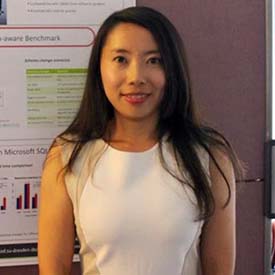Six promising young EEMCS researchers receive Veni grant
The Veni grant is a funding instrument from the Talent Programme of the Dutch Research Council (NWO). It allows researchers who have recently obtained their PhD to conduct independent research and develop their ideas for a period of three years. The Veni grant amounts to a maximum of EUR 280,000. A total of 17 researchers from TU Delft received a Veni, including 6 promising young researchers from the EEMCS faculty. A fantastic achievement by these researchers!
Through their research, the Veni winners contribute to important research themes within the faculty, such as energy transition and health & wellbeing. These researchers are committed to vital research, each of which has a major impact on society. Wonderful work by these researchers and congratulations!
In the Applied and Technical Sciences (TTW) research domain Veni’s were awarded to the following EEMCS researchers:
Aleksandra Lekić
SAFE-GRID: Smart and Flexible Control for a Power Electronics-based Electrical Grid
 SAFE-GRID will conduct fundamental research on a new fast microsecond-control design for power electronic (PE)-based electrical grids. The new methodology will be based on a specially adapted data-driven Model Predictive Control. It will guarantee stable grid operation even in the case of unforeseen disturbances and speed up fault elimination with smaller voltage deviations and power overshoots. Furthermore, this control will guarantee fast grid protection operation that can significantly increase the reliability of the PE-based electrical grids.
SAFE-GRID will conduct fundamental research on a new fast microsecond-control design for power electronic (PE)-based electrical grids. The new methodology will be based on a specially adapted data-driven Model Predictive Control. It will guarantee stable grid operation even in the case of unforeseen disturbances and speed up fault elimination with smaller voltage deviations and power overshoots. Furthermore, this control will guarantee fast grid protection operation that can significantly increase the reliability of the PE-based electrical grids.
The provided solutions are urgently needed for the realization of a 600GW PE-based wind farm connected electrical grid to satisfy the European energy demands.
Charlotte Frenkel
AdaptEdge – Brain-inspired smart devices that can continuously learn from their environment
 While smart devices outline strong promises ranging from productivity gains in industry to smart cities and health-monitoring wearables, there is still one major hurdle hindering their successful deployment: long-term robustness. Indeed, once deployed, smart devices are currently unable to autonomously adapt to changes in their environments, new user features, and evolving task requirements. This implies either electronic waste through device replacement, or increased battery drain and maintenance cost for frequent over-the-air device updates. This project will overcome this hurdle by merging the latest neuroscience and machine-learning research in continual learning to endow smart devices with low-power long-term autonomous adaptation.
While smart devices outline strong promises ranging from productivity gains in industry to smart cities and health-monitoring wearables, there is still one major hurdle hindering their successful deployment: long-term robustness. Indeed, once deployed, smart devices are currently unable to autonomously adapt to changes in their environments, new user features, and evolving task requirements. This implies either electronic waste through device replacement, or increased battery drain and maintenance cost for frequent over-the-air device updates. This project will overcome this hurdle by merging the latest neuroscience and machine-learning research in continual learning to endow smart devices with low-power long-term autonomous adaptation.
In the Exact and Natural Sciences (ENW) research domain Veni’s were awarded to the following EEMCS researchers:
Anna Lukina
Explainable Monitoring
 The digital revolution is here but we are not ready for it. Artificial intelligence already automates many processes in the real-world applications, such as train operation or financial fraud detection. It is, however, brittle in novel scenarios and does not allow humans to validate its reasoning. This research will marry formal mathematical reasoning with machine learning and visualization to ensure in real time that the deployed algorithms behave the way human experts expect. Explainable Monitoring will make interpretability an intrinsic feature of formal real-time monitoring.
The digital revolution is here but we are not ready for it. Artificial intelligence already automates many processes in the real-world applications, such as train operation or financial fraud detection. It is, however, brittle in novel scenarios and does not allow humans to validate its reasoning. This research will marry formal mathematical reasoning with machine learning and visualization to ensure in real time that the deployed algorithms behave the way human experts expect. Explainable Monitoring will make interpretability an intrinsic feature of formal real-time monitoring.
Havva Yoldaş
Mathematical analysis of metastability in complex biological systems (MetaMathBio)
 Many biological systems such as molecular transport, gene regulation, and neural networks exhibit multiple stable states, and they can instantaneously switch between these states depending on internal or external conditions. This phenomenon is known as metastability. For example, such dynamics of neural networks in the brain is linked to neurological disorders such as epilepsy and Alzheimer’s disease. This research develops a mathematical framework to investigate metastable behaviour in biological systems. The results will lead to a better understanding of their complex dynamics and can be used in predicting and controlling their behaviour.
Many biological systems such as molecular transport, gene regulation, and neural networks exhibit multiple stable states, and they can instantaneously switch between these states depending on internal or external conditions. This phenomenon is known as metastability. For example, such dynamics of neural networks in the brain is linked to neurological disorders such as epilepsy and Alzheimer’s disease. This research develops a mathematical framework to investigate metastable behaviour in biological systems. The results will lead to a better understanding of their complex dynamics and can be used in predicting and controlling their behaviour.
Rihan Hai
Understanding Implicit Dataset Relationships for Machine Learning
 Big data has become a powerful driving force for breakthroughs in many domains. With the recent popularity of machine learning, large-scale data is used to train models to derive insights. However, the implicit relationships hidden in the data, e.g., correspondences, correlation, and dependencies, are often overlooked, tremendously increasing human effort and hindering valuable discoveries. In this project, I aim for a scientific breakthrough in understanding how these data relationships affect learning tasks by discovering, extracting, and formalizing hidden dataset relationships. My Veni will significantly impact how data can be used to prompt scientific discoveries in a wide range of fields.
Big data has become a powerful driving force for breakthroughs in many domains. With the recent popularity of machine learning, large-scale data is used to train models to derive insights. However, the implicit relationships hidden in the data, e.g., correspondences, correlation, and dependencies, are often overlooked, tremendously increasing human effort and hindering valuable discoveries. In this project, I aim for a scientific breakthrough in understanding how these data relationships affect learning tasks by discovering, extracting, and formalizing hidden dataset relationships. My Veni will significantly impact how data can be used to prompt scientific discoveries in a wide range of fields.
Yoeri Dijkstra
Understanding salt intrusion in estuaries under climate change and human interventions
 In estuaries, saline seawater may intrude several dozens of kilometres inland, making the river water brackish and unsuitable for irrigation and human consumption. Due to sea level rise, droughts, and river deepening, this will become more severe in the future. In this study it is investigated how much such salt intrusion may aggravate, which future scenarios are most critical, and which physical processes are causing this. To this end, a new type of mathematical model will be developed, which allows efficient investigation of salt intrusion processes in many different rivers under many scenarios for climate change and human interventions.
In estuaries, saline seawater may intrude several dozens of kilometres inland, making the river water brackish and unsuitable for irrigation and human consumption. Due to sea level rise, droughts, and river deepening, this will become more severe in the future. In this study it is investigated how much such salt intrusion may aggravate, which future scenarios are most critical, and which physical processes are causing this. To this end, a new type of mathematical model will be developed, which allows efficient investigation of salt intrusion processes in many different rivers under many scenarios for climate change and human interventions.
Through the Veni grant, NWO encourages curiosity-driven and innovative research. NWO selects researchers based on the quality of the researcher, the innovative nature of the research, the expected scientific impact of the research proposal and opportunities for knowledge use.